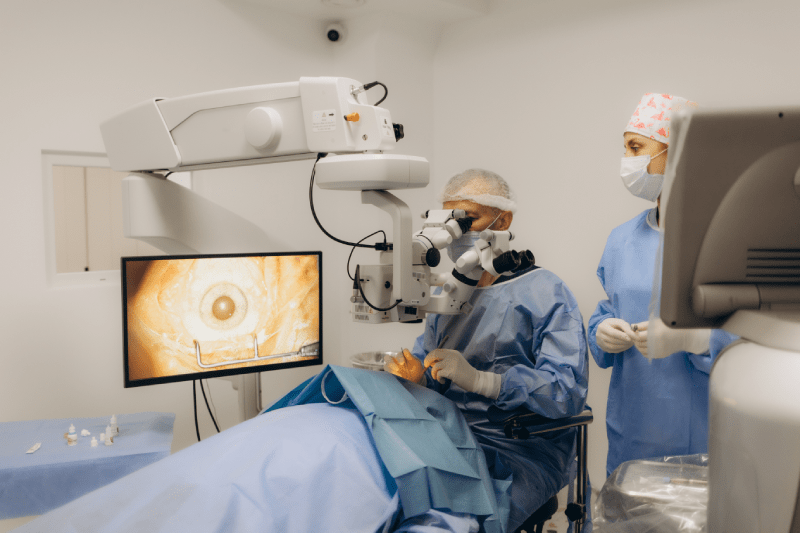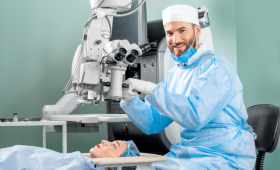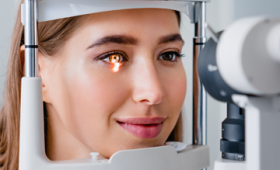What Is The Average Cost Of Trifocal Lens Treatment In Turkey?
The average cost of trifocal lens treatment in Turkey varies according to the quality of the lens brand used (German, Swiss, or American origin), the surgical technique (phacoemulsification), and the clinic’s comprehensive package services. However, this cost is 50% to 70% lower than the prices for the same quality of treatment in Europe or the UK. This large price advantage stems from Turkey’s low operational expenses and the high foreign exchange rate advantage. Patients can protect their budgets by including all travel expenses in the total cost.
Why Are Trifocal Lens Prices More Affordable Compared To European Countries?
The main reason why trifocal lens prices are more affordable in Turkey is the low general operational and personnel costs and the high value of foreign currencies against the Turkish Lira (exchange rate advantage). Turkey obtains discounted prices in lens supply thanks to the high case volume and passes this advantage on to patients. The lenses and surgical equipment used are at international standards, but low operational costs ensure more attractive prices.
What Is The Difference In Cost Between One Eye And Two Eye Treatment?
It is generally recommended that both eyes be operated on in trifocal lens treatment. The cost of one eye treatment is not half the total cost of two eyes. This is because the cost of detailed pre-operative tests, surgical preparation, and operating room use is similar even for a single eye. Having both eyes operated on simultaneously (or at short intervals) is more logical in terms of both quickly establishing visual balance and lowering the unit cost.
How Much Do Premium Lens Brands Affect The Total Cost?
The premium lens brands used in the treatment (ZEISS, Alcon, Bausch + Lomb, etc.) increase the total cost somewhat compared to local or standard brands. This increase is due to the advantages offered by premium lenses, such as superior optical quality, enhanced night vision, and lower risk of light scattering. However, thanks to the exchange rate advantage in Turkey, patients can access these premium lenses at a cheaper price than the standard lens prices in their own countries. Choosing a quality lens should be seen as a critical investment for long-term visual quality.
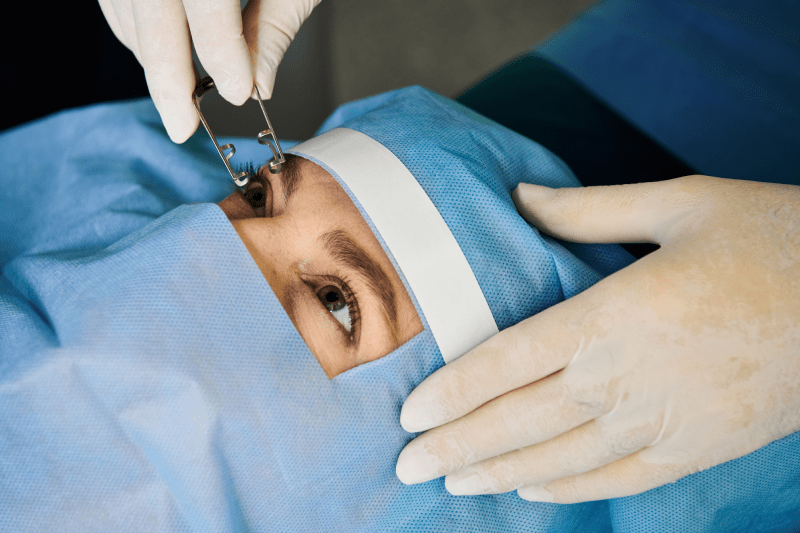
What Is Included In Trifocal Lens Treatment Packages?
Reliable clinics in Turkey generally offer comprehensive, all-inclusive packages for international patients. These packages may include the cost of the lenses, the surgical operation, detailed pre-operative eye examinations, necessary post-operative medications/drops, VIP transfer services, and accommodation (usually in 4-5 star hotels). These services offer a level of comfort that allows the patient to focus solely on the treatment, eliminating stress and logistical issues.
Is The Guarantee Of Getting Rid Of Glasses Included In The Fee?
Trifocal lens treatment aims for patients to achieve clear, glasses-free vision at far, intermediate, and near distances. After a successful surgery, 98% of patients are usually free from dependence on glasses. Clinics generally do not offer a written “getting rid of glasses guarantee” but provide a satisfaction guarantee. If a small refractive error remains rarely, this condition can usually be corrected free of charge with an additional laser intervention (PRK/LASIK). This correction guarantee is an assurance of the treatment’s long-term success.
Is The Cost Of Astigmatism Correction Included In The Package?
Most patients also have astigmatism. Trifocal lenses are produced with toric properties that can also correct astigmatism. The cost of toric lenses is somewhat higher than standard spherical lenses. However, whether this additional cost is included in the package price or requires a separate fee depends on the clinic’s pricing policy and the patient’s degree of astigmatism. The use of toric lenses is mandatory for high degrees of astigmatism and is unavoidable for long-term clear vision.
Is A Fee Charged If A Second Surgical Intervention Is Necessary?
A large second surgery, such as the removal or exchange of the lens in trifocal lens treatment, is rarely needed. If a small refractive error remains after the surgery (which is expected), this is usually corrected free of charge with Excimer Laser (PRK/LASIK) (touch-up). Reliable clinics generally offer this touch-up guarantee for one year after the surgery. In case of a major complication resulting from the surgery itself, the continuation of the treatment is covered by the guarantee.
Is VAT Exemption Applied For Getting Rid Of Glasses Surgeries?
It is possible to apply Value Added Tax (VAT) exemption for medical services received by foreign patients coming to Turkey within the scope of health tourism, provided legal conditions are met. This exemption further reduces the total amount the patient will pay, providing an ** additional financial advantage**. Clinics and intermediary institutions like Cure Holiday manage the necessary processes in compliance with legal regulations so that patients can benefit from this tax advantage.
In Which Cases Does The Cost Of Trifocal Lens Treatment Increase?
The cost of trifocal lens treatment increases in the following situations: 1) The necessity of a toric lens due to a high degree of astigmatism, 2) The treatment of additional eye diseases such as pre-operative glaucoma or retinal detachment, 3) The preference for premium lens brands, 4) The preference for sedation or general anesthesia option. These additional costs may be necessary to increase the safety and quality of the treatment and must be included in the budget.
What Are The Most Reliable Trifocal Lens Brands?
The most trusted and preferred international trifocal lens brands on the market include premium brands such as ZEISS (Germany), Alcon (USA), and Bausch + Lomb. These brands’ lenses have high biocompatibility, superior optical design, and proven long-term clinical success. Leading clinics in Turkey use these international premium brands tailored to the patient’s eye structure and budget. Cure Holiday ensures the certified use of these brands.
How Does The Surgeon’s Experience Affect The Success Rate?
Trifocal lens surgery (Phaco) is a micro-surgical procedure requiring a ** high level of precision**. The surgeon’s experience is vital for the correct and millimetric precision placement of the lens and the reduction of post-operative complication risk. Eye surgeons in Turkey have international levels of experience due to their high case volume. An experienced surgeon is the greatest assurance of the treatment’s permanent success and the patient’s final visual acuity.
Does Trifocal Lens Treatment Also Correct Cataracts?
Yes, trifocal lens treatment not only corrects near vision problems (presbyopia) but also permanently treats cataracts. A cataract is the clouding of the eye’s natural lens over time. In trifocal lens surgery, the natural lens, which is already cloudy, is removed and replaced with an artificial trifocal lens. This corrects both refractive errors and cataracts, ensuring the patient achieves clear vision for life and prevents future cataract formation.
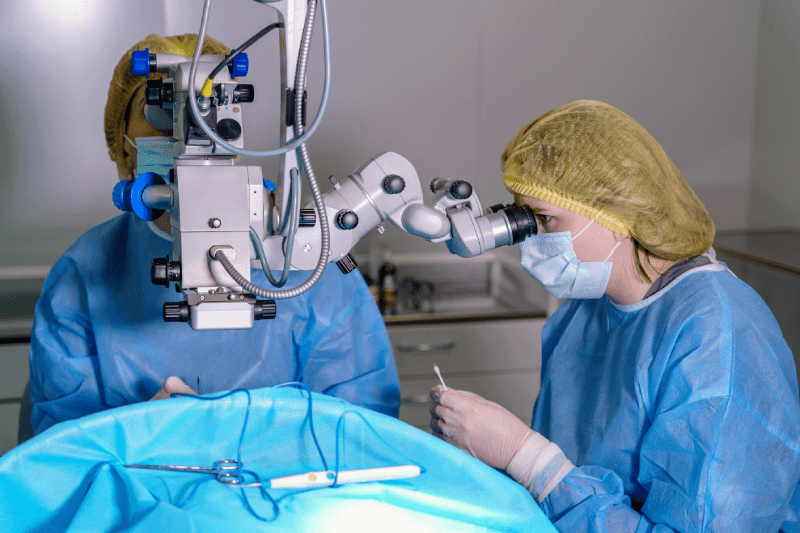
Which Lenses Are Recommended To Improve Night Vision Quality?
Trifocal lenses carry a risk of slight light scattering (halo or glare) in some patients, especially during night driving or in low-light environments. To minimize this risk, premium lenses with special optical designs (e.g., ICL, special aspheric designed trifocal lenses) are recommended. These lenses aim to reduce the effect of light scattering by optimizing light refraction. The most suitable lens choice is made by evaluating the patient’s profession and night vision expectations before the surgery.
Is Trifocal Lens Treatment Permanent And What Is Its Lifespan?
Trifocal lenses are artificial lenses permanently placed inside the eye and are designed to last for a lifetime. The lens material (usually acrylic or silicone) is biocompatible and does not degrade or cloud over time. Once these lenses are placed, it means the patient will not experience cataracts or near vision problems again. This offers a permanent solution in terms of getting rid of glasses and improving the quality of life.
In Which Cases Is A Standard Lens Preferred Over A Multifocal Lens?
Very rarely, if the patient’s eye structure has serious retinal diseases, advanced glaucoma, or widespread corneal irregularities, standard monofocal (single-focus) lenses may be preferred instead of trifocal (multifocal) lenses. Monofocal lenses provide clarity at a single distance (far), posing less risk to visual quality in such complex eye diseases. In this case, the patient has to continue using reading glasses for near and intermediate distances.
Why Is The Pre-Operative Biometry Test Of Critical Importance?
The biometry test is the most critical stage of trifocal lens surgery. This test measures the patient’s eye axis, corneal curvature, and eye length with millimetric precision. The data obtained is used to calculate the exact power (dioptre) of the artificial lens to be placed inside the eye. An incorrect biometry measurement can lead to the selection of the wrong lens power and ultimately, the failure of the surgery. Expert clinics in Turkey use state-of-the-art devices for this measurement.
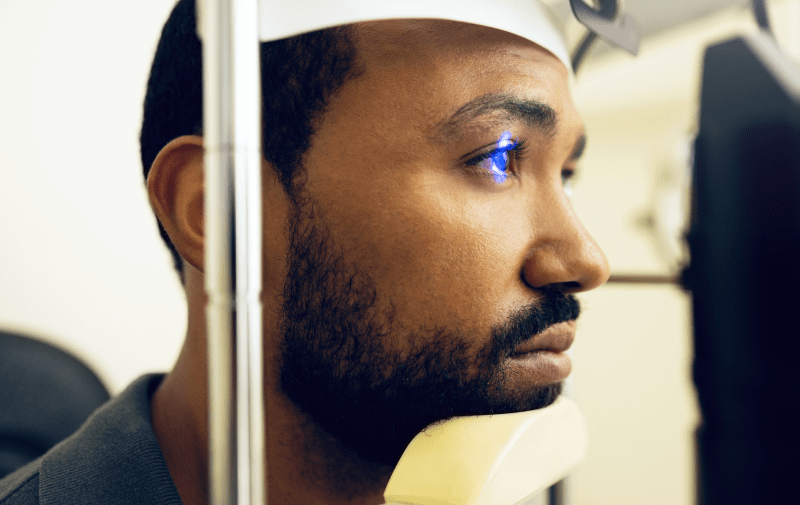
How Many Days Should The Post-Operative Check-Ups Last In Turkey?
The initial post-operative checks are critical. It is recommended that the patient stays in Turkey for an average of 3 to 4 days. This duration is necessary for the surgical operation, one night of rest, and most importantly, the mandatory first-day check-up after the surgery. The first-day check-up is vital for the surgeon to check visual acuity and the correct position of the lens. Long-term checks are usually performed at 1 week, 1 month, and 6 months.
Is There A Risk Of Permanent Light Scattering (Halo) Associated With The Lens?
Trifocal lenses are designed to distribute light to different focal points, and this may cause effects like light scattering (halo) or glare in some patients, especially during night driving. This condition usually decreases or disappears within a few months as the brain adapts to the lens (neural adaptation). The optical design of premium lenses is focused on minimizing this risk. This rare effect is a characteristic of multifocal lenses, not a complication of the treatment.
How Is Visual Quality Affected If Astigmatism Correction Is Not Performed?
If the patient has significant astigmatism in their eye during trifocal lens treatment and this defect is not corrected using a toric lens, the final visual acuity achieved significantly decreases. Astigmatism prevents light from focusing at a single point on the retina and disrupts the multifocal advantage of the lens. Therefore, physicians strongly recommend the toric trifocal lens option to patients with astigmatism. Astigmatism correction is an indispensable step for the overall success of the treatment.
How Many Times Is It Necessary To Come To Turkey For Trifocal Lens Surgery?
Trifocal lens surgery is generally completed in a single trip. It is sufficient for the patient to stay in Turkey for 3 to 4 days. Tests are done on the first day, surgery on the second, and the mandatory check-up on the third. Operating on both eyes sequentially (on the same day or the next day) is a common practice. This short travel period prevents patients from taking a long leave from work and offers a comfortable process thanks to the logistical advantages of Turkey.
How Is Lens And Glasses Use Regulated Before Surgery?
For detailed and accurate measurements to be taken before the surgery, patients using contact lenses must stop using them at least 1-2 weeks before the surgery and only use glasses. Glasses use is stopped immediately before the surgery. This preparation ensures that the cornea returns to its natural shape and that the calculation of the lens power is error-free. The accurate outcome of the corneal map is vital for the success of the treatment.
Is Pain Or Discomfort Felt During The Surgery?
No, trifocal lens surgery is a completely painless procedure. The eyes are brought under local anesthesia with special drops applied before the surgery (topical anesthesia). The patient only feels sensations like bright lights or the sound of water during the surgery but does not feel any pain. The sedation (conscious sleep) option can rarely be used to relax the patient and control eye movements, which provides additional comfort.
What Should Be Expected On The First Day After Surgery?
On the first day after surgery, the patient’s visual acuity increases rapidly, but slight blurring, light sensitivity, and watering are expected. The patient must wear special protective glasses or a shield to protect their eyes. The mandatory check-up is performed the day immediately following the surgery, and the surgeon checks the lens position and the recovery process. It is vital for the patient to rest and use the eye drops regularly on this first day.
When Is The Return To Normal Life And Driving Resumed?
The return to normal life after trifocal lens treatment is very fast. Patients can usually return to their daily activities such as reading and using a computer within a few days. Driving is resumed after both eyes’ visual acuity is fully clear and with the surgeon’s approval, generally within one week. Caution is advised initially for night driving, as the effect of light scattering may take time to pass.
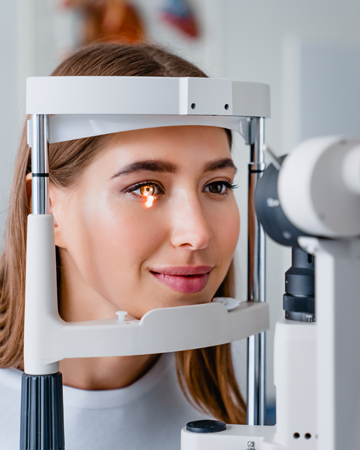
Which Sports And Activities Are Prohibited After Surgery?
It is important to protect the eyes from impact, water, and dirt in the first week after surgery. Water-contact sports such as swimming or sea activities and heavy sports that carry a risk of impact to the eye should generally be avoided for at least 2 weeks. Light exercise and walking can be resumed after a few days. These restrictions are necessary to minimize the risk of infection in the eye and ensure the lens position remains stable.
In Which Cases Is LASIK Or PRK Treatment Preferred?
If the patient is under 40 years old and has not started experiencing near vision problems (presbyopia) or does not have cataracts, LASIK or PRK laser treatment may be a more suitable option than the Trifocal Lens. Laser treatments reshape the cornea to correct the refractive error. However, for patients aged 40 and over, as the eye’s natural lens is replaced, Trifocal Lenses are a more permanent and comprehensive solution for glasses-free living.
When Is Eye Makeup And Lens Use Permitted After Surgery?
To prevent the risk of post-operative infection, eye makeup (mascara, eyeliner, shadow) and contact lens use are generally prohibited for at least 2 weeks. This duration is necessary for the eye to heal completely and the surgical incision to close. Patients must also strictly avoid rubbing their eyes during this period. Adherence to these rules is vitally important for the success of the treatment.
What Are The Most Suitable Cities For Treatment In Turkey?
The most preferred and specialized cities for trifocal lens treatment in Turkey are Istanbul, Ankara, and Izmir. These cities stand out due to their hospitals with international accreditations, surgeons with high case volume, and advanced logistical facilities. Istanbul offers a wide range of physicians and clinics, while Izmir and Antalya attract patients by combining the comfort of treatment with holiday opportunities.
Is The Use Of Protective Glasses Mandatory After Surgery?
Yes, the use of protective glasses or sunglasses is mandatory in the first day and first week after surgery. These glasses protect the eyes from impact, dust, wind, and most importantly, UV rays. UV rays can negatively affect the healing process in the eye. Additionally, the use of special shields while sleeping is a critical preventive measure to prevent rubbing the eyes.
What Are The International Accreditations Of Clinics In Turkey?
Reliable eye clinics in Turkey have internationally recognized JCI (Joint Commission International) accreditation and the T.R. Ministry of Health’s Health Tourism Authorization Certificate. JCI proves that the clinic complies with global standards in patient safety, hygiene, and treatment protocols. These accreditations are the most important evidence of the quality of the treatment for international patients.
How Are Accommodation And Transfer Services Provided?
Health tourism experts like Cure Holiday offer packages that include VIP airport transfers and accommodation in 4-5 star hotels during the treatment period for the patient’s comfort. These services ensure that all logistical processes are managed by experts from the patient’s arrival in Istanbul or Izmir. This allows the patient to focus solely on their treatment and have a stress-free recovery period.
How Is The Expertise Of The Eye Physician Checked?
The expertise of the eye physician performing the surgery should be checked based on their specialization in Ophthalmology and preferably their high case experience in Cataract and Refractive Surgery. The physician’s international certifications, membership in professional associations, and past success in trifocal lens surgery should be questioned. Cure Holiday directs patients to specialists with the highest competence in this field.
Is There An Age Limit For Trifocal Lens Surgery?
Trifocal lens surgery is generally applied to patients aged 40 and over who experience presbyopia (near vision loss) and/or have cataracts. Since the eye’s natural accommodation ability is not fully lost before age 40, laser treatment (LASIK) is usually recommended for younger patients. There is no upper age limit; any patient whose general health status and eye health are suitable can undergo the surgery.
Which Chronic Diseases Pose A Risk Before Surgery?
Chronic diseases such as uncontrolled advanced diabetes, active eye infections, severe dry eyes, and advanced glaucoma may pose a risk or prevent trifocal lens surgery. It is mandatory for systemic diseases like diabetes to be controlled before the surgery. Physicians evaluate the patient’s general health status with detailed blood tests and examinations to minimize risks.
When Is Air Travel Permitted After Surgery?
Air travel is generally permitted without any restrictions after trifocal lens surgery. Since the surgery is micro-surgical and does not significantly affect eye pressure, patients can safely fly immediately after the mandatory check-up on the day following the surgery. This allows patients to utilize their short stay in Turkey most efficiently.
How Is English Language Support Provided By The Eye Doctor?
Clinics in Turkey focused on health tourism employ fluent English-speaking coordinators and translators for the comfort of international patients. Institutions like Cure Holiday guarantee continuous translation support throughout the entire process, from the first contact to discharge. This ensures that the patient fully understands medical instructions and communicates aesthetic expectations correctly.
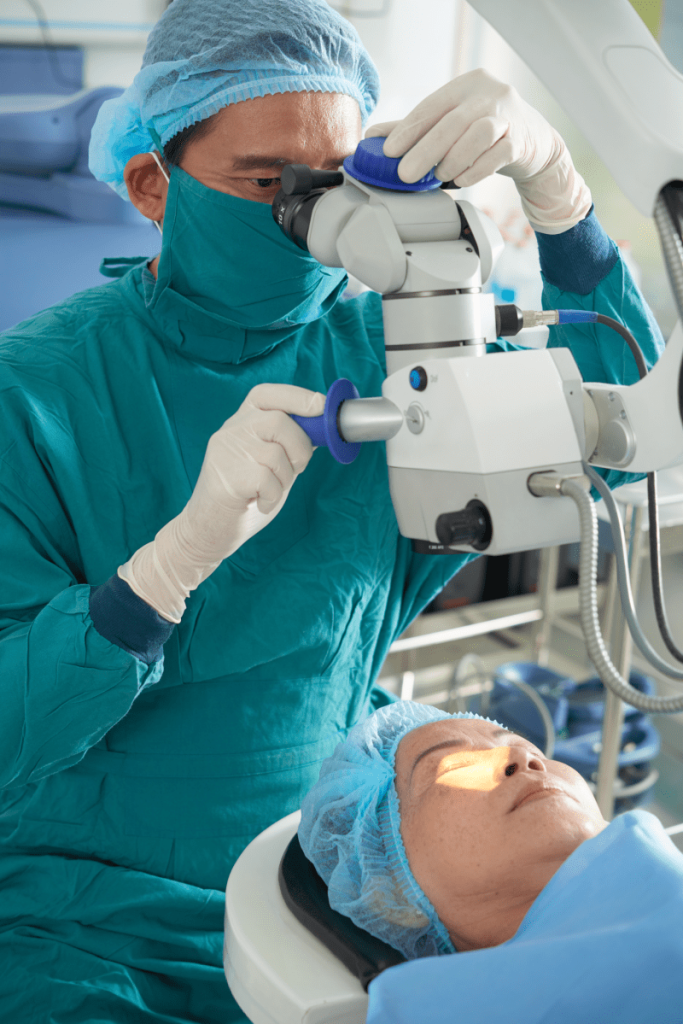
How Long Should Eye Drops Be Used After Surgery?
Post-operative eye drops (antibiotic and cortisone-containing) should be used meticulously according to the surgeon’s schedule for an average of 3 to 4 weeks. These drops are vital for preventing the risk of infection, controlling inflammation, and accelerating the healing process. The cost of these medications and drops is generally included in the treatment package.
Does The Use Of Reading Glasses Completely Disappear After Surgery?
Yes, the fundamental goal of trifocal lens treatment is for the patient to regain clear, glasses-free vision at far, intermediate, and near distances. After a successful surgery, patients’ dependence on reading glasses completely disappears. Very rarely, low-powered glasses may be needed for reading small print in low light, but even these situations are minimal.
Do Trifocal Lens Treatments Degrade In Later Years?
No, trifocal lenses are permanent artificial lenses and once placed, they do not degrade, change power, or cloud over. The lifespan of the lens is designed to provide clear vision for the rest of the patient’s life. Once these lenses are placed, it means the patient will not experience cataracts or near vision problems again. This offers a permanent solution distinct from glasses and contact lenses.
Is Lens Treatment Suitable For Patients With High Myopia Or Hyperopia?
Yes, trifocal lens treatment (or a different intraocular lens like ICL) is a very suitable and safe option for patients with refractive errors such as high myopia (e.g., above -10) or high hyperopia. These lenses provide clear vision even in cases where laser treatments are insufficient or the cornea is too thin. The treatment is performed by adjusting the power of the eye’s natural lens.
In Which Cases Should LASIK Be Preferred Over Lens Treatment?
If the patient does not have cataracts and is under 40 years old (meaning near vision problems have not started), LASIK or PRK laser treatment, which reshapes the cornea to preserve the eye’s natural accommodation ability, may be more suitable. Trifocal lenses are generally preferred for older patients dealing with cataracts or presbyopia.
Does Post-Operative Dry Eye Become Permanent?
Post-operative dry eyes are usually temporary and disappear within a few weeks or months. Trifocal lens surgery carries a lower risk of dry eyes than LASIK, as it affects the corneal nerves less. Physicians prescribe plenty of artificial tears to manage this condition. Permanence is very rare, and additional treatment is applied in cases of advanced dry eyes.
How Many Days Should Water And Soap Be Avoided After Surgery?
It is vital to protect the eyes from direct water and soap for the first 3 to 5 days after surgery to prevent the risk of infection. Care should be taken to prevent water from coming into contact with the eye during face washing and showering. Only sterile solutions and wipes recommended by the surgeon should be used to clean the area around the eyes.
Is It Necessary To Return To Turkey For Long-Term Check-Ups?
Long-term check-ups (usually after 6 months or 1 year) are important for monitoring the success of the treatment and the stability of the lens. It is recommended that these checks be performed at the clinic in Turkey. Check-up examinations are generally free of charge; the patient only covers the travel expenses (airfare). Cure Holiday can also assist patients in managing the process by coordinating with physicians in their home country.
What Is The Cost Of Pre-Operative Tests?
The cost of all tests performed before the surgery, such as biometry, corneal mapping (topography), eye pressure, and detailed fundus examinations, is generally included in the Trifocal Lens Package and no separate fee is charged to the patient. These comprehensive examinations are mandatory and critical for calculating the correct lens power and zeroing out surgical risks.
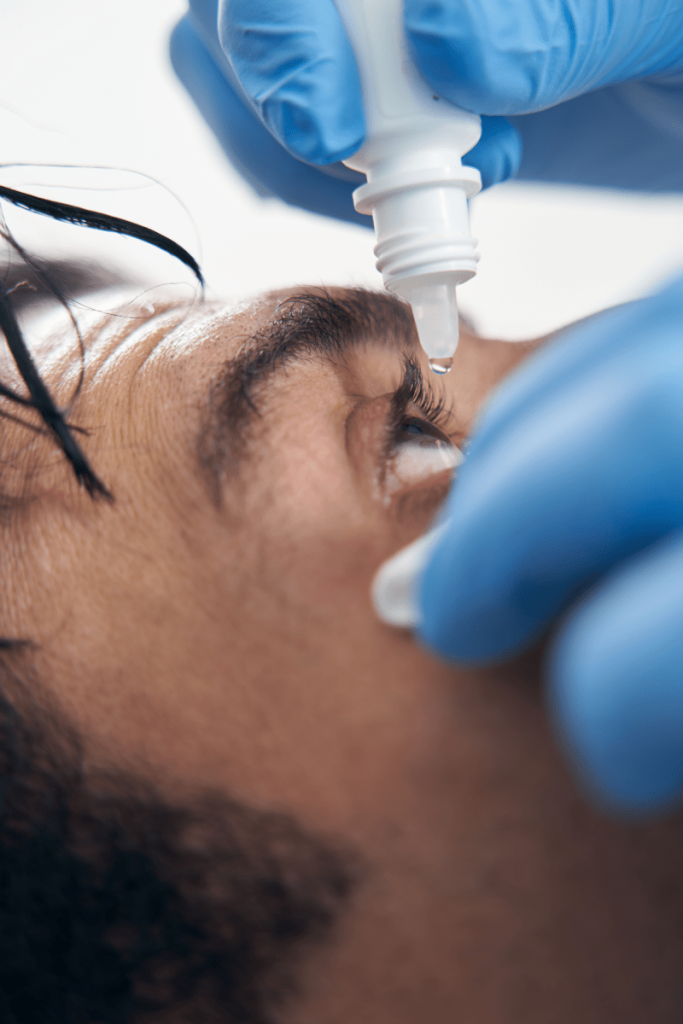
Is Guarantee Applied In Case Of Definitive Failure Of The Surgery?
The risk of major failure in trifocal lens treatment, such as the lens needing removal or vision defects persisting, is very low. If the failure is due to a clinical or surgical error, reliable clinics guarantee the continuation of the treatment or correction surgery. However, problems resulting from the patient’s own chronic diseases or failure to follow instructions may be excluded from the warranty. Transparent contracts clearly state these guarantees.
When Does High Definition Vision Begin After Surgery?
The patient’s high-definition (HD) clear vision generally begins within the first week after the surgery. Full stabilization of the eye and the brain’s adaptation to the new trifocal lens (neural adaptation) may take a few weeks to 3 months. During this period, visual acuity continues to increase, and temporary effects like light scattering decrease.
Which Medications And Supplements Should Be Used After Surgery?
The surgeon prescribes antibiotic and cortisone-containing drops to accelerate healing and prevent infection after the surgery. Additionally, artificial tear drops are recommended to manage dry eyes. In addition to these drops, supplements such as Omega-3 or special eye vitamins may be used upon the physician’s recommendation. The cost of these medications is generally included in the package.
How Is The Treatment Process Combined With A Holiday In Turkey?
Trifocal lens treatment can be easily combined with a holiday due to the short stay period (3-4 days) required. Patients can explore the historical peninsula of Istanbul or the Bosphorus view, protecting their eyes from the sun, after the first mandatory rest day after surgery. The luxury accommodation and transfers provided by Cure Holiday enhance the comfort of the treatment and turn the process into an enjoyable cultural trip.
Does Trifocal Lens Treatment Permanently Eliminate The Need For Glasses?
Yes, the biggest advantage of trifocal lens treatment is that it permanently eliminates the necessity of using glasses or contact lenses for far, intermediate, and near distances for the patient’s lifetime. Since the lenses correct both cataracts and presbyopia simultaneously, the vast majority of treated patients achieve the comfort of clear vision at all distances and say goodbye to glasses.
What Is Cure Holiday’s Role In Trifocal Lens Treatment?
Cure Holiday acts as a bridge of trust, quality, and transparency for patients in trifocal lens treatment. It identifies the best eye surgeons and clinics with international accreditations (JCI) suitable for the patient’s budget and medical needs. It manages all logistical processes, such as VIP transfers, luxury accommodation, and uninterrupted interpreter support, ensuring the patient focuses solely on the treatment. This represents a stress-free and guaranteed treatment process for patients.
